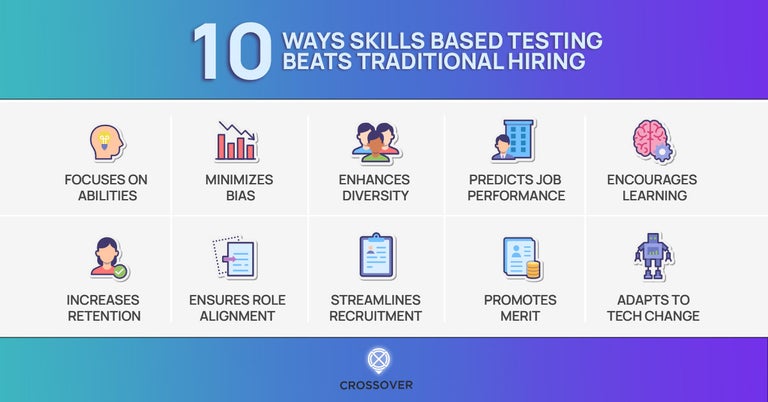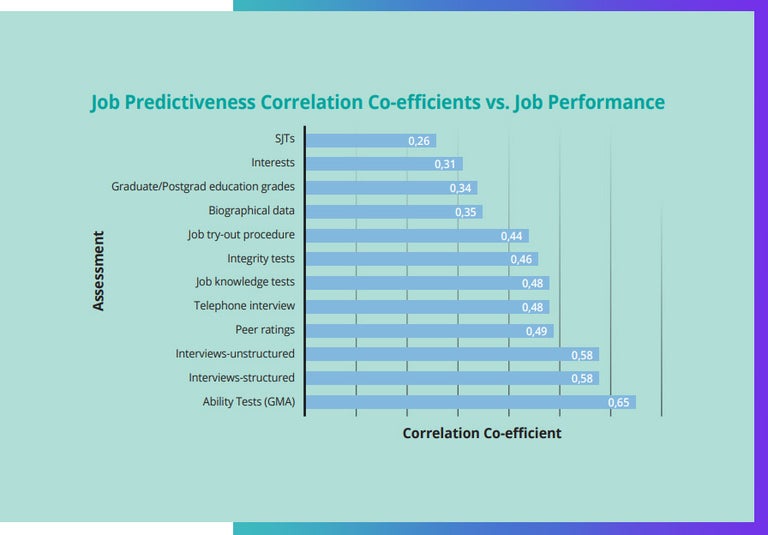Contents
- 1. Focuses on Abilities, not Credentials
- 2. Minimizes Bias
- 3. Enhances Diversity
- 4. Predicts Job Performance
- 5. Encourages Continued Learning
- 6. Increases Retention
- 7. Ensures Job Role Alignment
- 8. Streamlines the Recruitment Process
- 9. Promotes a Merit Based Workplace
- 10. Adapts to Technological Change
Is skills based assessment better than traditional hiring? Yes! There's a reason why that Ivy League graduate didn’t perform as expected. It’s because credentials don’t equal skills, and we’re here to explain why.
The traditional hiring process isn't working like it used to. In fact, The US Congressional Committee recently got together for a full committee hearing about transitioning to a skills-based economy.
“There is a growing recognition that the old ways of identifying talent are not working for today's economy,” said Rep Virginia Foxx, who chairs the education and workforce committee.
With our top lawmakers openly discussing the need to shift to skills-based hiring – clearly there’s a serious need.
If you've found yourself questioning whether a degree from a prestigious university actually equates to talent, rest assured you’re one of many.
We're exploring 10 ways that skills assessment is a better way to hire, especially for remote work leaders seeking the best from the global talent pool.
Here’s what skills testing has to offer you.

1. Focuses on Abilities, not Credentials
Is a diploma worth the paper it's printed on if it doesn’t translate into job competency? Skills assessments prioritize what candidates can actually do, not where they studied or who they've worked for. It's talent, not the name-dropping game.
A Harvard study found that more jobs now require a college degree, even though they didn't before. This is called degree inflation and it's a real problem.
Because of this, companies are not considering competent candidates for roles that they are suited for. Aptitude tests in your recruitment process help fix this.
2. Minimizes Bias
We're all biased, even when we think we’re not. The beauty of skills assessment? It doesn't care about your unconscious preferences. It’s as cold and impartial as an iceberg, focusing on ability, not superficial details that could lead us astray. Skill tests reduce bias!
Research shows that structured interviews and work sample tests (a form of skill testing) are among the most effective ways to predict job performance, while unstructured interviews can often introduce bias.
3. Enhances Diversity
The world's a diverse place, so why should your remote team be any different? Skills assessment opens doors for candidates of all backgrounds, providing you a rainbow spectrum of talent.
Great people exist everywhere, far beyond local borders. But finding the golden needle in the haystack is nearly impossible with traditional hiring methods. Skills-based tasting gives us a better way of matching the right people to the right job.
A 2015 McKinsey report revealed that companies in the top quartile for ethnic and racial diversity were 35% more likely to experience above-average profitability than less diverse companies.
It pays to look beyond people that live in your City, to find diversity of all shapes and sizes.
4. Predicts Job Performance
Want to see the future? No need for a crystal ball. Skills testing for recruitment can provide a sneak peek at job performance, measuring what a candidate can do rather than what a piece of paper says they can do.
The difference is subtle, but measurable - psychometric tests work.
A study by Pearson found that checking skills can strongly predict job performance, with a correlation coefficient of up to 0.65. The study included a variety of tests, with ability tests as the most reliable predictor.

5. Encourages Continued Learning
What's better than a qualified employee? One that never stops learning. Skills-based hiring tests encourage continuous skill development. It's Darwinism at its best: adapt, evolve, and improve.
According to a report by IBM, employees who spend more time learning are more likely to be innovative, meet their business's quality standards, be more productive, and respond effectively to customers.
Workers who get 40 hours of training annually had a 10% higher productivity rate compared to their colleagues. Clearly employees who learn more, do more.
6. Increases Retention
Employees hired based on their actual skills rather than inflated resumes are more likely to stick around. It's like picking the right puzzle piece rather than trying to force a square peg into a round hole.
A recruitment process that focuses on finding the right people using skills tests, improves retention.
According to a 2023 LinkedIn report, 93% of organizations are concerned about employee retention. The best way to improve it, is by providing ongoing learning opportunities and skill-building.
7. Ensures Job Role Alignment
Not everyone can be a star quarterback! A skill check ensures candidates fit the job roles you need, avoiding the fantasy football approach to team building.
Glassdoor found that a 10% harder interview process is associated with 2.6% higher employee satisfaction later on.
This shows that when employees are tested and fit well in their roles, they tend to have higher job satisfaction because alignment is there.
8. Streamlines the Recruitment Process
Forget sifting through a pile of resumes higher than Mount Everest. Skill assessments can streamline your hiring process, saving time and sanity.
A report from the Society for Human Resource Management found that 84% of HR managers are finding applied skills shortages in job applicants.
Skills testing screens out individuals who can’t do the job and speeds along time-to-hire for relevant applicants.
These skills assessments are a big-time saver.
9. Promotes a Merit Based Workplace
A skill assessment doesn't care about who you know, but what you know. It champions merit over pedigree, promoting a fair, level playing field where performance is key.
Research by Deloitte found that organizations building a skills-based culture were 63% more likely to achieve results across financial, business and 11 other key areas.
Softs skills and hard skills are relevant as people gain work experience.
10. Adapts to Technological Change
In a world where tech skills become obsolete before your coffee cools, skills-based tests help you keep pace. They're more attuned to rapidly changing job roles and the skills needed for them.
According to the World Economic Forum’s Future of Jobs Report – 50% of all employees will need reskilling by 2025 as technology adoption evolves and increases.
Testing for much-needed skills is a smart way to stay ahead of the curve.
So, stop chasing credentials and start focusing on actual skills. Skills based assessments are a fair, effective, and efficient way to hire in our fast-changing digital world.
It’s time to kick traditional hiring practices to the curb and let skills assessments take center stage.
The skill wave is coming, are you ready for it?







